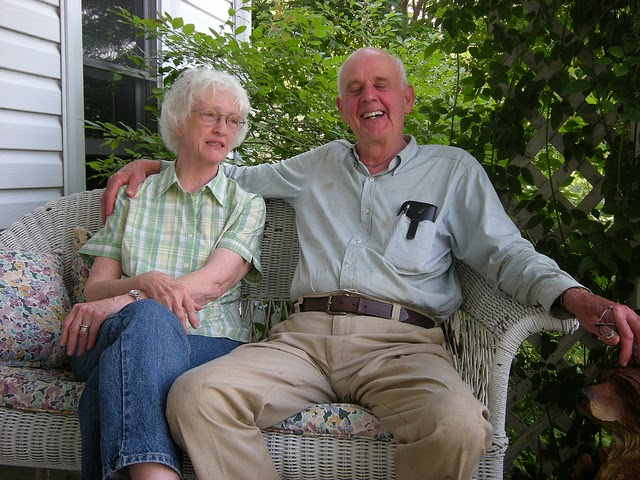Just over a week ago, I lost my maternal grandmother, Dorothy Mullins. She had just celebrated her 94th birthday back in October, but had been slowly declining in health in recent weeks and months. As I did a number of years ago for my paternal grandfather, I was privileged to give a eulogy at her funeral this past weekend, which I'll share here...
Showing posts with label Wendell Berry. Show all posts
Showing posts with label Wendell Berry. Show all posts
Monday, November 18, 2019
Thursday, February 5, 2015
The earth and debt: Marriage in Wendell Berry
From
Toledo, IA
 |
| Tanya & Wendell Berry Photo by Ann Thompson via Flickr |
Becoming a good steward of the earth involves learning to live, love, and tend with the land, not over or against it. It's about identifying the rhythms of life, health, and beauty already at work in nature, and partnering with it in our human culture-making, through which we create the stuff and meaning from the world we inhabit and use (channeling Andy Crouch's thinking on culture here).
And it's not a question of whether we do this culture-making and use of the world (or our relationships, such as marriage), but how, which reflects our moral character. Meador isolates what he thinks might be the heart of Berry's vision and purpose for writing as he does, with a quote from The Gift of Good Land:
“To live, we must daily break the body and shed the blood of Creation. When we do this knowingly, lovingly, skillfully, reverently, it is a sacrament. When we do it ignorantly, greedily, clumsily, destructively, it is a desecration. In such desecration we condemn ourselves to spiritual and moral loneliness, and others to want.”So it goes in creation, so it goes in marriage.
Thursday, March 13, 2014
Wendell Berry and Mennonite online education
From
Toledo, IA
- The ed-tech vision for collaboration in Mennonite education
- Cultivating affection in online education?
Here's an excerpt from the end of the second post:
What I find compelling about the potential for online education within the Mennonite tradition and its various institutions of higher education (including both EMU & Tabor College), is the possibility of a radical online education. One that’s “subversive” in the sense that it uses the tools of the digital age but calls out their contingency, questions their inevitability, highlights their pitfalls and ultimate limits. I’m talking about deconstruction. – But deconstruction on the way to developing attitudes and practices which can help re-construct something more life-giving than what our consumer culture can provide: Affection for self and neighbors – friends and enemies, affection for place, and ultimately (in the Christian context) affection for our creating and sustaining God. And when we do this in collaboration with each other - rather than mimicking the logic of consumer capitalism – the radical potential only increases, deepening roots and establishing routes/linkages that contribute to the common good of Mennonite communities and institutions, and those whom we serve (i.e. “the world.”)
Thursday, October 24, 2013
Down in the muck: Wendell Berry on the "inescapable cruelty" of life
From
Toledo, IA
 |
| "Down in the Muck" (photo by Andrew Stawarz/Flickr/CC BY-ND 2.0) |
Around minute 30 of the interview, Berry talks about the gross mistreatment of and cruelty to animals that our industrial food system requires. He then pauses and acknowledges an "inescapable cruelty" to all human life, even for vegetarians. "We have to live at the expense of other creatures." The rule then, he says, is to use fellow creatures (plants and animals) - and the land upon which we all dwell - with the minimum of violence.
Moyers then asks Berry to read the poem, "For the Hog Killing":
Let them stand still for the bullet, and stare the shooter in the eye,
let them die while the sound of the shot is in the air, let them die as they fall,
let the jugular blood spring hot to the knife, let freshet be full,
let this day begin again the change of hogs into people, not the other way around,
for today we celebrate again our lives' wedding with the world,
for by our hunger, by this provisioning, we renew the bond.
Subscribe to:
Posts (Atom)

